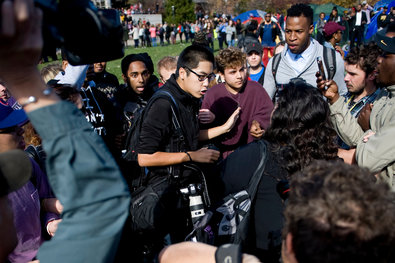
   |

Why Has Trust in the News Media Declined?
Half a century ago young people protesting authority enlisted the news media in their fight, chanting “the whole world is watching.” This week, anti-racism demonstrators at the University of Missouri angrily denounced journalists. Vice President Spiro Agnew articulated the most memorable Republican criticism of the media until last month, when candidates’ denunciation of reporters was central to the presidential debate in Colorado. But polls show that trust in the news media has generally fallen. Why do so many people say they don’t trust the news media, and what does that mean?
* protest = 항의[반대]하다, 이의를 제기하다/ authority = 당국; 지휘권; 권한/ enlist = (협조, 참여을) 요청하다; 입대하다/ chant = 구호[성가]를 외치다, 연호하다/ anti-racism = 인종 차별 반대주의/ denounce = 맹렬히 비난하다/ articulate = (생각・감정을) 분명히 표현하다[설명하다]/ denunciation = (공개적으로 하는) 맹렬한 비난/ central = 가장 중요한, 중심되는 ![]() 어째서 많은 사람들이 그들은 뉴스 매체를 믿지 않는다고 말하며 그것의 의미는 무엇인가요?
어째서 많은 사람들이 그들은 뉴스 매체를 믿지 않는다고 말하며 그것의 의미는 무엇인가요?
1. Young Black People See the News Media’s Double Standard
It is hard to trust an institution that ignores you unless you are perceived as causing a problem for "the rest of us."
2. ‘Trust’ Has Come to Mean Affirmation
Americans say they want accuracy and impartiality, but polls suggest what most of us want is to hear what we believe.
3. Liberal News Media Bias Has a Serious Effect
Clustering left-of-center viewpoints in newsrooms leads to a cloistering, with reporters unfamiliar with conservative viewpoints.
Sample Essay
‘Trust’ in the News Media Has Come to Mean Affirmation
Trust in the news media is a sinking ship. Three-quarters of Americans trusted the news in the post-Watergate years, but, according to Gallup, that plummeted to 44 percent in 2004. Weirdly, it rebounded to 50 percent in 2005, but ever since its drifted gently downward. Why? What do the people want from the news?
Americans say they want accuracy and impartiality, but the polls suggest that, actually, most of us are seeking affirmation. Americans want the news to be patriotic, which explains the big drop in 2004 when stories abounded about Abu Ghraib, the 9/11 commission’s slam on the government’s handling of terrorism, and the Senate Intelligence Committee finding that the White House “overstated” the threat of weapons of mass destruction. Plus, it was an election year. Trust in news media always dips in election years.
The news media is most valued when it reflects our best selves, which explains that pop up in 2005. Often, the coverage of Hurricane Katrina was wildly inaccurate, but reporters (especially on TV) used their airtime to yell at the authorities, expressing our collective pain, and shame. Yay, Anderson Cooper! Yay, Shepherd Smith! We trust you!
But more important, the Internet has changed society's relationship with the news. For one thing, it’s enabled us to construct digital silos, battlements from which, like the French in Monty Python’s Holy Grail, we fire invective on the people below.
Some news organizations base their business models on denouncing “mainstream media." A particular example is the top-rated Fox News channel, which flogs its “outsider” status. True, the political right has claimed victimization by news media since at least Nixon, but that 45-year defamation campaign reached peak force when the Internet shrank the public square.
But there is ample proof that the Internet has also really “leveled the playing field” between the most powerful and the least. Now the marginalized can speedily gather, demand recognition and challenge the prevailing narratives. This happens every day and it’s far better than the alternative.
Let’s not forget that most institutional entities have taken a public opinion hit. Public faith in organized religion has dipped to 42 percent, the Supreme Court to 30 percent, the presidency to 29 percent, the banks to 26 percent, big business to 21 percent and Congress, to 7 percent. By that measure, news media is doing pretty well. (Not TV or Internet exclusive news — that’s in the teens.) But essentially the crisis, if there is one, is elsewhere — everywhere.
   |




